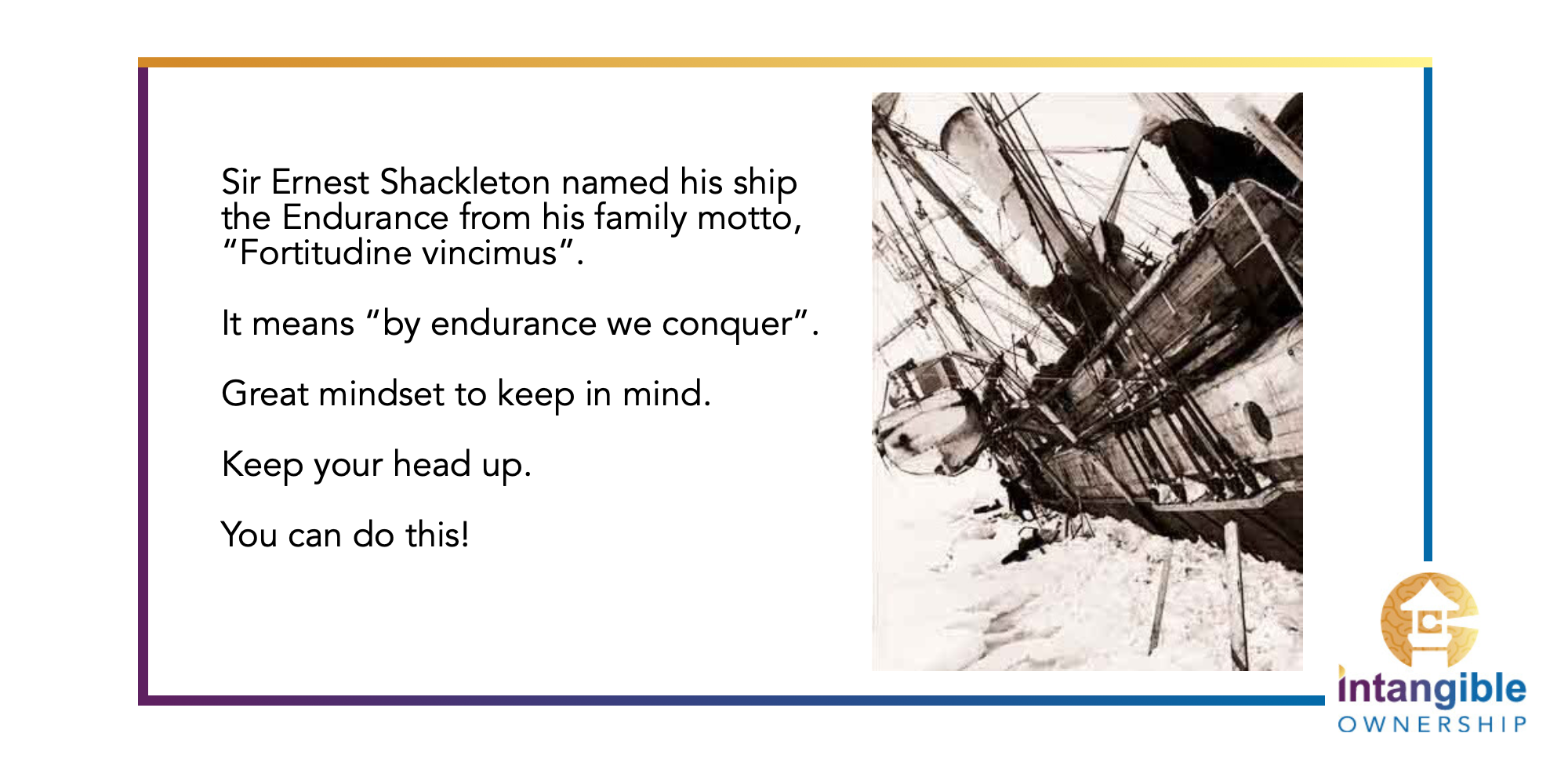
Have you heard or seen of the discovery of the HMS Endurance?
On March 9 news broke of a discovery of perhaps the most complete sunken wooden ship of all time. The Endurance has quite a history, but even more amazing than the sunken ship’s discovery is the story of how 28 men all survived the frozen two and a half year journey in the uninhabitable waters of Antartica.
This is not that story. Instead, you will read four pivotal details of the story that I believe kept the crew alive when, statistically speaking, none should have survived. These same four details can help your teams increase their effectiveness and exceed far beyond “survival mode” that many businesses are experiencing in our current world conditions.
Let’s keep your team from sailing to the end of the world and sinking their ships.
If you find yourself wondering the full details of the incredible story of the Endurance and her crew, I would suggest you check out Shackleton’s Captain. It is a documentary of the expedition made in 2013. Or if you are a reader, try Endurance: Shackleton’s Incredible Voyage.
This adventure is the life-and-death-true-story version of a team building exercise.
First and foremost: every team should have a clear objective.
Clarity on day-to-day objectives is essential to keep a team high functioning. For example: someone hired to fulfill a traditional front desk job may see their objectives as answering the phone, or welcoming clients. That objective may serve in the short term, but it really isn’t the true objective of that position. At it’s core, the position is there to ensure that the initial interaction of any person with that given company is five-star service up front. Empowering a front desk individual to provide five-star service every day is quite a perspective shift from the job of answering phones and welcoming clients. When given the opportunity to own that position, you will find new that the empowered employee opens the door to new ideas of delivering five-star service. For the men who were selected to join the Endurance, it was clear that the objective of the group was to get to Antartica, traverse the continent, and return home as the first group to have accomplished such a feat.
What happened was not in the original objective.
Second: be willing to adapt your clear objective to the changing conditions and circumstances of life.
The Endurance crew was led by a man affectionately called “The Boss”. His name was Sir Ernest Shackleton. He had selected the captain of the Endurance himself. The captain’s name was Frank Worsley. When the Endurance became so entrenched in ice, that no amount of human effort could break it clear, the objective shifted to waiting for a season for the ice to melt. Nine months later, the objective changed to abandoning the Endurance. Weeks later, it changed to staying alive. The decisions of both of these leaders to change their objectives due to changing conditions and circumstances in their world, led to the survival of every man aboard the Endurance.
As business owners, what objectives need to shift due to your world conditions that will allow you to save your crew?
Third: a process of clear communication. Be sure it’s not assumptive communication.
George Bernard Shaw has been known to have said, “The single biggest problem in communication is the illusion that it has taken place.” In order for teams to stay on the same page, no team member should run under the assumption that any given task is “somebody else’s job”. The situation may look all too familiar to you. “Why hasn’t such and such happened?” The response, ”Well, I don’t know. I sent him an email”. When it comes to clear communication, design your process in a way that lets both sides know that the sender and the receiver are clear that the communication been sent and received. The crew of the Endurance stuck together with very little miscommunication. At a time when working together meant life and death, clear communication meant life. The crew worked openly with each other. There had to be disagreements and frustration, but that did not stop them from keeping clear communication open through the two year process of survival.
Fourth: Successful teams with clear objectives, open to adjust as needed, with clear communication, become highly successful when clear accountability is present.
Frank Worsley was the captain of a ship destined to be crushed by ice and destroyed. Yet his accountability to his crew kept him in top form to perform. Over that 1000+ mile journey of floating ice, Frank used only a sextant to track the progress of his crew’s location. At one point, he and 5 other men left in a 22 foot boat to travel 800 miles over 30 days, while only having glimpsed the sun 3 times (a sextant only works through tracking sun location). Frank was the leader that every crew member could hold accountable. He did not shy away from the accountability the crew held on him. That accountability drove him to greater performance. Leaders who hold themselves to such levels of personal accountability for their teams can only find success in their businesses. Frank Worsley asked himself a valuable question that sparks a high level of accountability: what role did/do I play in the outcome of this situation. When we consider the role we each play in the outcomes of our companies, the door for clear accountability is opened.
If you find that your teams needs to clarify their objectives better, I can help with that. If those objectives are sinking, and it’s time to reevaluate, I can help with that. If you are having a communication breakdown inside your team or teams, I can help with that. If you are hoping to better hold yourself or teams accountable, I can help with that.
Sir Ernest Shackleton named his ship the Endurance from his family motto, “Fortitudine vincimus”. It means “by endurance we conquer”. Great mindset to keep in mind. Keep your head up. You can do this!
Reach out to me and let’s talk about how these influences can increase your personal or team performance in the every changing world around us.
As always, keep in mind that one step up makes all the difference.



